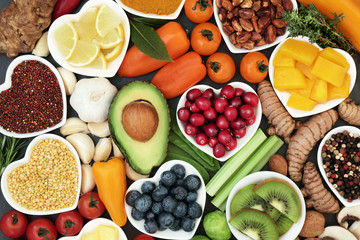During addiction recovery, it\’s important to concentrate on nourishing your body with foods that support physical and mental well-being. Recovering from addiction is a challenging journey that requires an overall approach, including proper nutrition. Eating the right foods can support your physical and mental health, aiding recovery. This guide explores the best additional recovery foods to include during addiction recovery.
Food and nutrition force the body with energy, as well as important vitamins and minerals that you need to start the physical repair and boost your immune function.
How Good Nutrition Impacts the Body in Addiction Recovery
Good nutrition is a foundation of addiction recovery, playing a vital role in healing the body and mind. By incorporating these addiction recovery foods into your diet, you can provide your body with the essential nutrients it needs to heal and regain strength during addiction recovery. Here are some foods that can be beneficial to eat during addiction recovery.
- Fruits and Vegetables: These contain vitamins minerals and other antioxidants that support overall health and aid in repairing damage caused by alcoholic addiction. Eat different fruits and vegetables like:
- Berries: Blueberries, blackberries, strawberries, and raspberries are rich in antioxidants and vitamins that support overall health. They can be eaten either fresh, or frozen, or added to smoothies or oatmeal.
- Citrus Fruits: Oranges, limes, grapefruits, and lemons are high in vitamin C and other antioxidants. They can be eaten whole, juiced, or added to salads and sauces.
- Apple: Apples are a good source of vitamin C. They can be eaten raw as a snack, sliced and added to salads, or cooked into sauces and desserts.
- Bananas: Bananas are rich in potassium and fiber, which can help regulate blood sugar levels and support digestive health. They make a convenient and portable snack.
- Broccoli: Broccoli is a nutrient-dense vegetable rich in vitamins C and K, folate, and fiber.
- Beans: Beans can support addiction recovery by providing a rich source of plant-based protein, fiber, vitamins, and minerals, which contribute to overall health, stabilize blood sugar levels, promote digestive health, and provide sustained energy, aiding in the repair and restoration of the body during the recovery process.
- Meat and Fish: Meat and fish are excellent sources of high-quality protein, which is essential for building and repairing tissues, including muscles, bones, skin, and organs. Eat different meat and fish like:
- Chicken breast and Turkey breast: These are an excellent source of protein that helps to repair tissues, muscles, and bones.
- Fish: Including fish in the diet during addiction recovery is beneficial due to its high content of omega-3 fatty acids, which support brain health, mood regulation, and overall well-being, while also providing essential nutrients and anti-inflammatory effects.
- Milk and Drinks: It’s important to stay hydrated and take care of your own health for fast recovery. Adequate amounts of milk and drinks should be drunk for a fast recovery. The drinks that should be drunk are:
- Water: Staying hydrated is crucial for overall health and well-being, especially during recovery. Water helps flush toxins from the body, supports digestion, and maintains proper hydration levels.
- Milk: Milk can aid in addiction recovery by providing essential nutrients such as protein, calcium, vitamin D, and B vitamins, which helps to build immunity power, helping to replenish the body\’s nutritional stores and promote physical and mental health during the recovery process.
- Herbal Teas: Herbal teas such as chamomile, peppermint, ginger, and rooibos can promote relaxation, reduce stress, and support digestive health. They are caffeine-free and can be enjoyed hot or cold.
- Green Tea: Green tea is rich in antioxidants and has been associated with numerous health benefits, including improved brain function, increased metabolism, and reduced risk of chronic diseases. It contains a moderate amount of caffeine, providing a gentle energy boost without the jitters associated with coffee.
Foods that should be avoided during the Addiction Recovery Period
- Processed Foods: Processed foods should be avoided. Unhealthy fats and additives can disrupt blood sugar levels, mood stability, and overall health. Examples include sugary snacks, processed meats, fast food, and pre-packaged convenience foods.
- Salty Foods: High-sodium foods, such as processed snacks, canned soups, and fast food, can lead to water retention, dehydration, and elevated blood pressure. Excess sodium intake can also exacerbate cravings and disrupt electrolyte balance.
- Unhealthy Snacks: Avoid unhealthy snacks like chips, cookies, and candy. Choose whole foods such as fruits, vegetables, nuts, seeds, and yogurt to support energy levels and overall health.
- Caffeine: Too much intake of caffeine can disrupt sleep patterns, increase anxiety and irritability, and worsen symptoms. Limit consumption of caffeinated beverages such as coffee, tea, energy drinks, and caffeinated sodas.
- High-Sugar Foods and Beverages: Foods and beverages with high sugar content can cause energy crashes, mood swings, and cravings. Limit consumption of sugary sodas, candies, pastries, and desserts.
- Alcohol: Avoid consuming alcohol, as it can cause cravings, interfere with judgment and decision-making, and increase the risk of relapse. Even small amounts of alcohol can trouble the recovery process.
How do I Balance my diet in Addiction Recovery?
Balancing your diet during addiction recovery involves considering the percentage of each food group you consume relative to your total daily intake. Here\’s a guideline for the percentage breakdown:
- Whole Grains, Legumes, Nuts, and Seeds: Aim for about 30-40% of your total daily calorie intake to come from these sources. These foods provide essential carbohydrates, protein, healthy fats, fiber, vitamins, and minerals.
- Vegetables: Endeavor to make vegetables around 30-40% of your plate at each meal, which corresponds to roughly the same percentage of your total daily intake. Vegetables are rich in vitamins, minerals, antioxidants, and fiber, supporting overall health and well-being.
- Fruits: Allocate about 10-20% of your total daily calorie intake to fruits. These provide essential vitamins, minerals, antioxidants, and fiber, and can be consumed as snacks or as part of meals to satisfy sweet cravings in a healthy way.
- Meats and Plant-Based Proteins: Dedicate around 15-25% of your total daily calorie intake to protein sources, including lean meats, poultry, fish, legumes, and plant-based protein sources like tofu and tempeh. Protein is essential for muscle repair, immune function, and overall health.
- Fatty Fish: Include fatty fish like salmon, mackerel, trout, and sardines in your diet at least twice a week, which corresponds to around 2-4 servings per week, or roughly 10-20% of your total weekly protein intake.
- Balanced Portions: Ensure that each meal is balanced, with a combination of carbohydrates, proteins, and fats. Pay attention to portion sizes and aim for moderate servings of each food group to meet your nutritional needs without overeating.
- Hydration: While water doesn\’t contribute directly to calorie intake, it\’s essential to stay hydrated throughout the day. Aim to drink at least 8 glasses of water per day, which can help support overall health and recovery.




